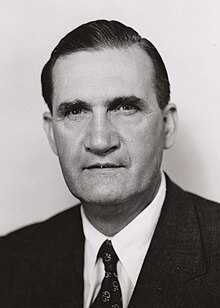Sir John McEwen | |||||||||||||||||||||||||||||||||||||||||||||||||||||||||||||||||||||||||||
|---|---|---|---|---|---|---|---|---|---|---|---|---|---|---|---|---|---|---|---|---|---|---|---|---|---|---|---|---|---|---|---|---|---|---|---|---|---|---|---|---|---|---|---|---|---|---|---|---|---|---|---|---|---|---|---|---|---|---|---|---|---|---|---|---|---|---|---|---|---|---|---|---|---|---|---|
 McEwen in 1957 | |||||||||||||||||||||||||||||||||||||||||||||||||||||||||||||||||||||||||||
| 18th Prime Minister of Australia | |||||||||||||||||||||||||||||||||||||||||||||||||||||||||||||||||||||||||||
| In office 17 December 1967 – 10 January 1968 | |||||||||||||||||||||||||||||||||||||||||||||||||||||||||||||||||||||||||||
| Monarch | Elizabeth II | ||||||||||||||||||||||||||||||||||||||||||||||||||||||||||||||||||||||||||
| Governor‑General | Lord Casey | ||||||||||||||||||||||||||||||||||||||||||||||||||||||||||||||||||||||||||
| Preceded by | Harold Holt | ||||||||||||||||||||||||||||||||||||||||||||||||||||||||||||||||||||||||||
| Succeeded by | John Gorton | ||||||||||||||||||||||||||||||||||||||||||||||||||||||||||||||||||||||||||
| Deputy Prime Minister of Australia | |||||||||||||||||||||||||||||||||||||||||||||||||||||||||||||||||||||||||||
| In office 10 January 1968 – 5 February 1971 | |||||||||||||||||||||||||||||||||||||||||||||||||||||||||||||||||||||||||||
| Prime Minister | John Gorton | ||||||||||||||||||||||||||||||||||||||||||||||||||||||||||||||||||||||||||
| Preceded by | Office established; Himself (de facto, 1967) | ||||||||||||||||||||||||||||||||||||||||||||||||||||||||||||||||||||||||||
| Succeeded by | Doug Anthony | ||||||||||||||||||||||||||||||||||||||||||||||||||||||||||||||||||||||||||
| De facto 26 March 1958 – 17 December 1967 | |||||||||||||||||||||||||||||||||||||||||||||||||||||||||||||||||||||||||||
| Prime Minister | Robert Menzies Harold Holt | ||||||||||||||||||||||||||||||||||||||||||||||||||||||||||||||||||||||||||
| Preceded by | Arthur Fadden | ||||||||||||||||||||||||||||||||||||||||||||||||||||||||||||||||||||||||||
| Succeeded by | Himself (1968) | ||||||||||||||||||||||||||||||||||||||||||||||||||||||||||||||||||||||||||
| 5th Leader of the Country Party | |||||||||||||||||||||||||||||||||||||||||||||||||||||||||||||||||||||||||||
| In office 26 March 1958 – 5 February 1971 | |||||||||||||||||||||||||||||||||||||||||||||||||||||||||||||||||||||||||||
| Deputy | Charles Davidson Charles Adermann Doug Anthony | ||||||||||||||||||||||||||||||||||||||||||||||||||||||||||||||||||||||||||
| Preceded by | Arthur Fadden | ||||||||||||||||||||||||||||||||||||||||||||||||||||||||||||||||||||||||||
| Succeeded by | Doug Anthony | ||||||||||||||||||||||||||||||||||||||||||||||||||||||||||||||||||||||||||
| Deputy Leader of the Country Party | |||||||||||||||||||||||||||||||||||||||||||||||||||||||||||||||||||||||||||
| In office 22 September 1943 – 26 March 1958 | |||||||||||||||||||||||||||||||||||||||||||||||||||||||||||||||||||||||||||
| Leader | Arthur Fadden | ||||||||||||||||||||||||||||||||||||||||||||||||||||||||||||||||||||||||||
| Preceded by | Arthur Fadden | ||||||||||||||||||||||||||||||||||||||||||||||||||||||||||||||||||||||||||
| Succeeded by | Charles Davidson | ||||||||||||||||||||||||||||||||||||||||||||||||||||||||||||||||||||||||||
| |||||||||||||||||||||||||||||||||||||||||||||||||||||||||||||||||||||||||||
| |||||||||||||||||||||||||||||||||||||||||||||||||||||||||||||||||||||||||||
| Personal details | |||||||||||||||||||||||||||||||||||||||||||||||||||||||||||||||||||||||||||
| Born | 29 March 1900 Chiltern, Victoria, Australia | ||||||||||||||||||||||||||||||||||||||||||||||||||||||||||||||||||||||||||
| Died | 20 November 1980 (aged 80) Toorak, Victoria, Australia | ||||||||||||||||||||||||||||||||||||||||||||||||||||||||||||||||||||||||||
| Political party | Country | ||||||||||||||||||||||||||||||||||||||||||||||||||||||||||||||||||||||||||
| Spouses | |||||||||||||||||||||||||||||||||||||||||||||||||||||||||||||||||||||||||||
| Education | Wangaratta State School Dandenong State School | ||||||||||||||||||||||||||||||||||||||||||||||||||||||||||||||||||||||||||
| Occupation | Farmer, politician | ||||||||||||||||||||||||||||||||||||||||||||||||||||||||||||||||||||||||||
Sir John McEwen GCMG CH (29 March 1900 – 20 November 1980) was an Australian politician and farmer who served as the 18th prime minister of Australia from 1967 to 1968, in a caretaker capacity following the disappearance of prime minister Harold Holt. He was the leader of the Country Party from 1958 to 1971, serving as the inaugural deputy prime minister of Australia from 1968 to 1971.
McEwen was born in Chiltern, Victoria. He was orphaned at the age of seven and raised by his grandmother, initially in Wangaratta and then in Dandenong. McEwen left school when he was 13 and joined the Australian Army at the age of 18, but the war ended before his unit was shipped out. He was nonetheless eligible for a soldier settlement scheme, and selected a property at Stanhope. He established a dairy farm, but later bought a larger property and farmed beef cattle.
After several previous unsuccessful candidacies, McEwen was elected to the House of Representatives at the 1934 federal election. He was first elevated to cabinet by Joseph Lyons in 1937. McEwen became deputy leader of the Country Party in 1943, under Arthur Fadden. He replaced Fadden as leader in 1958, and remained in the position until his retirement from politics in 1971. He served in parliament for 36 years in total, spending a record 25 years as a government minister.
The Liberal-Country Coalition returned to power in 1949, initially under Robert Menzies and then under Harold Holt. McEwen came to have a major influence on economic policy, particularly in the areas of agriculture, manufacturing, and trade. As soon as McEwen became the leader of the Country Party, he became the de facto deputy prime minister.
In December 1967, Harold Holt disappeared and was presumed dead while in office. As the de facto deputy prime minister, McEwen was commissioned as caretaker prime minister while the Liberal Party elected a new leader. He was 67 at the time, the oldest person to become prime minister and only the third from the Country Party. McEwen ceded power to John Gorton after 23 days in office in January 1968, and in recognition of his service was appointed deputy prime minister, the first time that position had been formally created. He was Australia's third shortest serving prime minister, after Earle Page and Frank Forde. He remained as deputy prime minister until his retirement from politics in 1971.